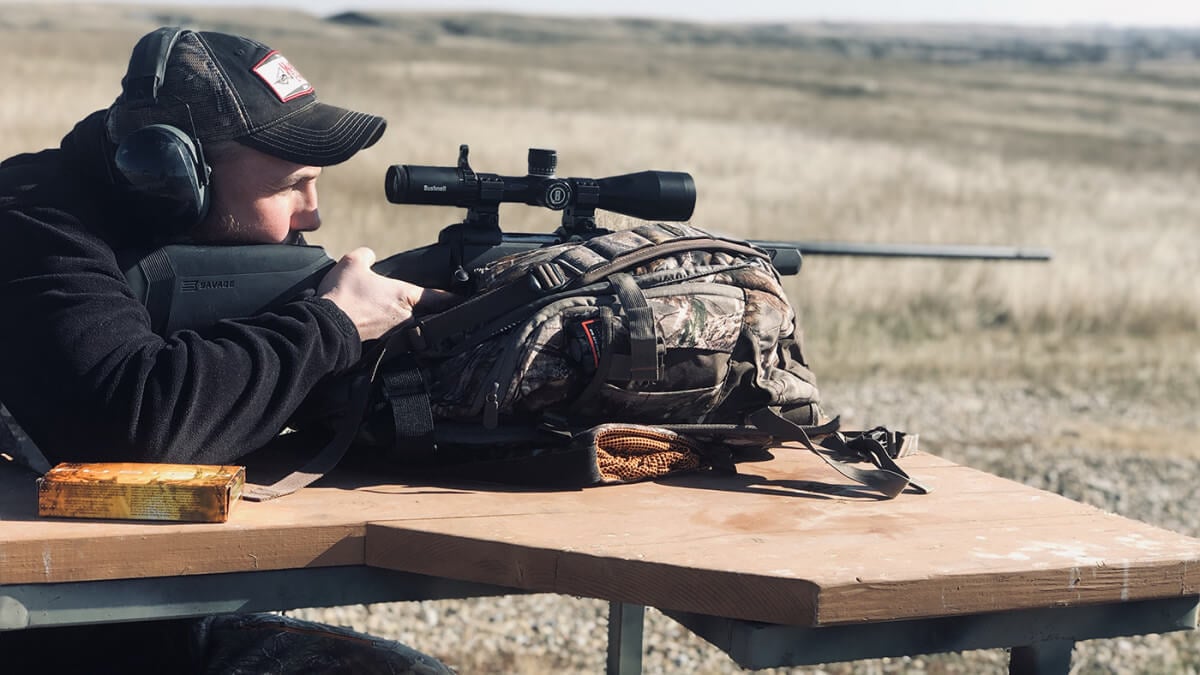- Savage Blog
- Mike Stroff's Shooting Tips to be a Better Hunter
Mike Stroff's Shooting Tips to be a Better Hunter

To be a better hunter, you need to be a better shooter. Taking the time in the off-season to sharpen your shooting skills is an investment that will pay off when it's time to punch tags. Savage ambassador and host of "Savage Outdoors" and "The One", Mike Stroff has four shooting tips to make you a better hunter.
Shoot Better with Iron Sights
Many of us learn to shoot using iron sights. Seems like just about everyone's first experience with a rifle is with iron sights. But once we start shooting with an optic, how many of us actually shoot with iron sights reguarly? Not as many as you'd think. Stroff believes that iron sights help develop and maintain important skill sets. There's a reason why that's how most of us learn in the first place! Stroff recommends practicing with your iron sight guns from time to time and get proficient with it at 100, 150 and 200 yards. Practice front sight acquisition and lining it up with the rear sight. It'll help make you a better shooter.
Trigger Work
It's impossible to make long range shots with a mushy trigger and a heavy pull. A lot of factory triggers are set excessively high due to safety concerns. A light, clean, crisp trigger break is critical to placing an accurate shot. It minimizes the influence a shooter can have on accuracy. But too light of a trigger pull increases the risk of accidental discharge if the gun is jarred or dropped. The AccuTrigger is the answer! It has safety measures built in to prevent it from firing if it is accidently dropped or jarred, and it is user-adjustable to allow the shooter to set the pull weight to their preferences. The AccuTrigger can be adjusted between 1.5 - 6 lbs (depending on the model) without sacrificing safety or paying a gunsmith to do a custom trigger job. Stroff prefers to set his AccuTrigger around 2 lbs, so he can break a nice, clean shot at long range.
Beat Barrel Heat
We've all done it. We've all been to the range and fired 15-20 shots in a row and let the barrel heat up. We get it. Shooting at the range is exciting. Unfortunately, that's not how most big game hunting scenarios unfold. We typically get one, maybe two shots from a cold barrel. Excessive barrel heat affects the point of impact. So shooting with a hot barrel at the range is not a good way to practice! Sporter or lighter barrels, which are typical in many hunting rifles tend to get hotter faster. When you see your bullets start to walk up the target during a shooting session, don't be tempted to adjust your scope or compensate for a shift in wind -- before you change anything, stop! Take a break. Let your barrel cool down and try again. If you're sitting there thinking, "But I came to the range to shoot! I don't want to take a break!" It's OK! Stroff has a solution for that too. "When I come to the range in the off-season and I'm going to do a lot of shooting, I'll just bring 3 or 4 guns. Take 2 or 3 shots, barrel needs to cool, I'm going switch rifles and I'll have some fun shooting another one," says Stroff. We like the way you think, Mike!
The Tape Trick
If you've ever seen Mike Stroff and wondered why he has electrical tape on his barrel, this is why: "The reason I do that is so nothing can get in my barrel," he explains. An obstructed barrel is an extremely dangerous condition, and a firearm should never be fired if the barrel has any type of obstruction. When you're hunting in the field, it's especially important to pay attention to the muzzle end of your barrel to ensure it stays clear of dirt, debris, snow or anything else that could obstruct it. Aside from an obstruction being dangerous, if you're in a place where you can't safely clear the obstruction, your hunting trip is over. No one wants that. That's why Stroff recommends putting a length of electrical tape over the muzzle end of your barrel to prevent anything from getting in it. It's a simple and easy trick, and you don't need to remove it before taking your shot. And it doesn't affect accuracy!
Bottom line: spend time behind your rifle in the off-season. Know your rifle inside and out, practice shooting different distances, from different positions, understand how your rifle, optic and ammo all work together. "Go to the range, shoot it your way, figure it out which way you do it better, and that way when you get that shot, you got that opportunity, you can be confident to make the shot every time," says Stroff. These shooting tips are a great place to start!


